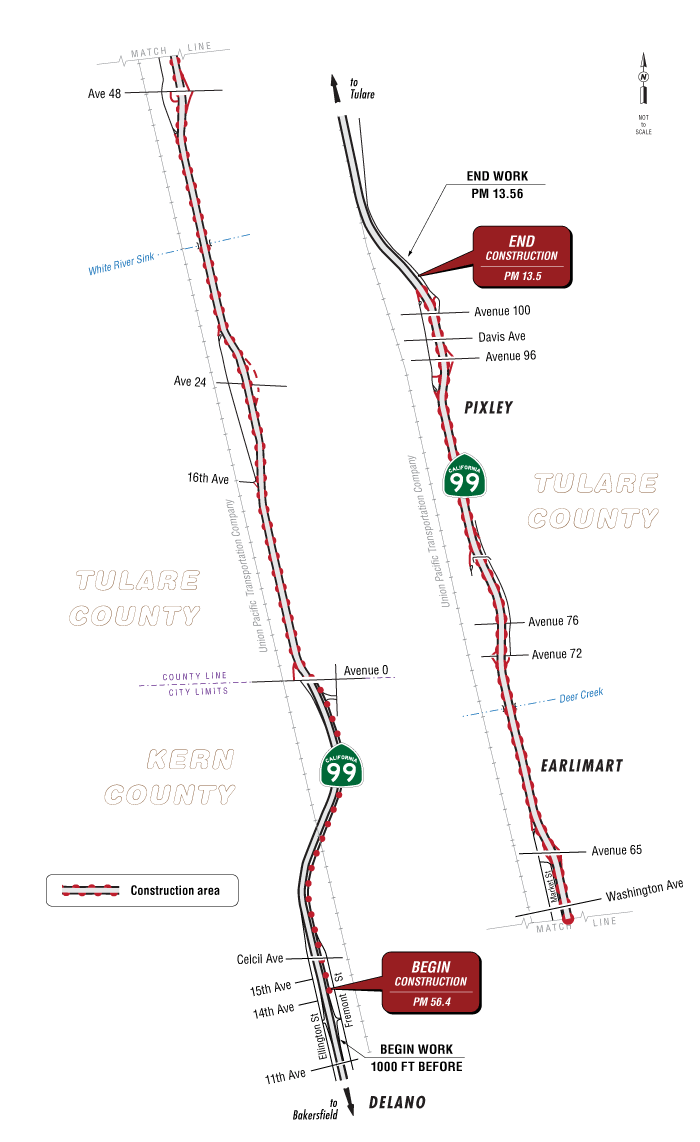State Route 99 Delano to Pixley 6-Lane With Pavement Rehabilitation
Project Description
The project is on State Route 99, from post miles 56.4 to 57.6 in Kern County and from post miles 0.0 to 13.5 in Tulare County. State Route 99 is currently a four-lane divided highway throughout the Tulare County portion of the project limits. The project proposes to build an additional lane, shoulder, and concrete barrier in the existing median and rehabilitate the pavement.

Project Benefits
Purpose
The purpose of this project is to improve operational deficiencies, improve freight movement, provide for future growth, and repair and extend the service life of the existing pavement along this segment of State Route 99.
Need
Enhancement of this segment of State Route 99 in Tulare County is needed to improve truck freight throughput and travel time reliability. In addition, the pavement within the project limits is distressed and needs to be repaired. Repairing the existing pavement would decrease the exposure of Caltrans maintenance crews over time and decrease the risk to their safety. Trucks account for approximately 22 percent of the Annual Average Daily Traffic count within the San Joaquin Valley corridor, compared with the state average of 9 percent of truck traffic. The 2020 California Freight Mobility Plan estimates over 463 million tons of goods moved into, out of, and within the region in 2010. This is expected to grow to more than 800 million tons by 2040.
The San Joaquin Valley produced $36.8 billion in agricultural commodities in 2020. The corridor includes eight of the top 10 agricultural-producing counties in California and the three largest agricultural-producing counties in the nation, producing 25 percent of the nation’s food supply. The San Joaquin Valley was responsible for $5.8 billion in dairy milk production alone in 2020, higher than any other state. About 250 different crops are grown in the San Joaquin Valley, and agricultural exports are shipped throughout the nation and internationally to over 100 countries. Also, the San Joaquin Valley is becoming a major logistical connection, with a growing number of mega-distribution centers and new manufacturing/processing facilities.
Estimated Funding Breakdown
| Funding Source | Funding Amount |
|---|---|
| Local | Not Applicable |
| State | $108,207,000 |
| Federal | $1,028,000 |
| Construction Cost | $84,700,000 |
Partnerships
- Tulare County Association of Governments (TCAG)
Proposed Project Schedule
| Process | Date |
|---|---|
| Final environmental document to be completed | Spring 2023 |
| Right-of-way acquisition to be completed | Not Applicable |
| Design to be completed | Spring 2024 |
| Advertise | Summer 2024 |
| Construction to begin | Fall 2024 |
| Construction to be completed | Fall 2026 |
Project Contact
Sumangali Hoode, Project Manager
Phone: 559-383-5189
Email: Sumangali.hoode@dot.ca.gov
Javier Almaguer, Senior Environmental Scientist
Phone: 559-287-9320
Email: Javier.Almaguer@dot.ca.gov
District 6 Public Information Office
Phone: 559-444-2409
Email: D6.Public.Info@dot.ca.gov
Documents
Accessibility Assistance: Caltrans makes every attempt to ensure our documents are accessible. Due to variances between assistive technologies, there may be portions of this document which are not accessible. Where documents cannot be made accessible, we are committed to providing alternative access to the content. Should you need additional assistance, please contact us at (916) 654-2852 or visit https://dot.ca.gov/request-ada-compliant-documents.
- Final Environmental Impact Report/Environmental Assessment With Finding of No Significant Impact - September 2023 (PDF, 8.81MB)
- California Environmental Quality Act Findings - September 2023 (PDF, 236KB)
- CEQA Statement of Overriding Considerations - September 2023 (PDF, 169KB)
News and Events
- Open House: Wednesday, April 5, 2023, from 5:00 p.m. to 7:00 p.m. in the La Vina Middle School Cafeteria at 1331 Browning Road, Delano, California 93215
Title VI Information
The California Department of Transportation (Caltrans) assures that no person shall, on the basis of race, color, or national origin, be excluded from participation in, be denied the benefits of, or be otherwise subjected to discrimination under any program or activity receiving Federal financial assistance, as required by Title VI of the Civil Rights Act of 1964, as amended, the Civil Rights Restoration Act of 1987, and Federal Executive Order 12898 (Federal Actions to Address Environmental Justice in Minority Populations and Low-Income Populations).
Caltrans will make every effort to ensure nondiscrimination in all of its programs and activities, whether they are federally funded or not, and that services and benefits are fairly distributed to all people, regardless of race, color, or national origin. In addition, Caltrans will facilitate meaningful participation in the transportation planning process in a nondiscriminatory manner.

